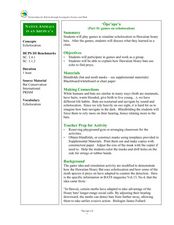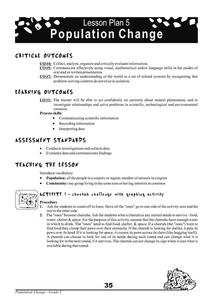Curated OER
Games on Echolocation
Get a little batty with life science! This fun simulation game replicates how bats use echolocation to hunt moths in their native Hawaiian habitat. After creating blind folds and discussing some basic principles of echolocation, students...
Cheetah Outreach
Population Change
Your youngsters become cheetahs in search of food, water, shelter, and space in a fun physical game that does a fantastic job of representing fluctuating species population based on resources available over years.
Curated OER
Introduction to Earth Sun Relationships Incorporating P.E.
Third graders investigate space science by performing physical activities. In this solar system instructional activity, 3rd graders perform a relay activitiy with their class in which they race between different "planets". Students...
Clarkson University
Understanding Energy (With a Pendulum)
Have you ever wanted to play with a giant pendulum? An experiment allows small groups to do just that. They gather data and make observations as they complete the included worksheet. The lesson plan lays out each instruction including...
Curated OER
Scrabble Laps
Students access that the purpose of this activity is to integrate physical fitness with spelling of core vocabulary words used in science and social studies. Students play the Scrabble Lap Game.
Curated OER
Turtle Hurdles
Students explore physical education by researching biology. In this survival techniques lesson, students discuss the methods turtles use to survive dangerous encounters and conduct a sea turtle role play exercise. Students identify the...
Curated OER
Why is the Average Temperature Greater on Venus than on Mercury?
Middle schoolers examine the reasons why the temperature is higher on Venus than on Mercury. In groups, they analzye both planet's atmospheres and determine the rate of global warming on each. They use the internet to research the...








